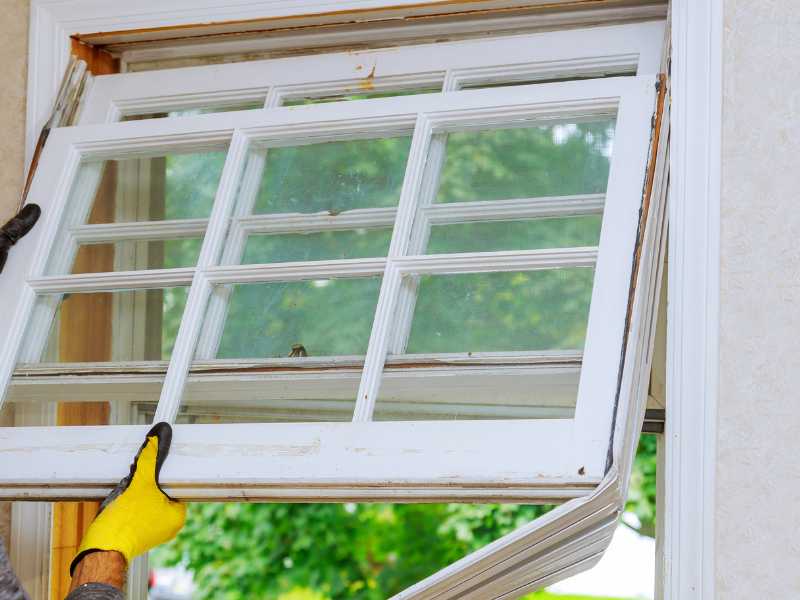Determining the right time to replace your home’s windows can be a practical home improvement endeavor with long-term benefits. Window replacement is often critical to maintain your home’s comfort, energy efficiency, and aesthetics. The need for new windows can present itself in various ways, such as visible damage, operational difficulties, and noticeable drafts. If you find that despite regular maintenance, your windows continue to struggle with condensation, it might be a clear indication that the seals are failing and replacement is due.

As windows age, they lose their efficiency, which may lead to increased energy bills and discomfort in your home. Taking into account the lifespan of your windows, which can vary anywhere from 20 to 50 years depending on the material and maintenance, it’s worthwhile to consider their current condition and performance. When windows start to fail, it’s not just about aesthetics or operation; it could also mean you’re losing money on energy costs due to poor insulation. Knowing when to invest in new windows can ultimately save you money and boost the overall value of your property.
Key Takeaways
- Replacement windows boost comfort and energy efficiency.
- Aged or damaged windows can lead to increased energy costs.
- Proper window selection can enhance property value and save money.
Signs of Window Failure

When your windows start showing signs of wear and tear, it’s important to recognize these indicators so you can take timely action.
Visible Damage
Cracks or Breaks: If you see cracks in the glass or the window frame, this is a clear sign that your window’s integrity is compromised. Broken parts can lead to further damage and potential safety hazards.
Warped or Rotted Frames: Wooden frames can warp or rot over time, particularly in damp climates. Inspect your window frames regularly for any signs of decay, as this is a sure sign they need replacement.
Drafts and Leaks
Feeling a Breeze: If you feel air coming through your windows even when they are closed, you’re experiencing drafts. This not only makes your living space less comfortable but also indicates your windows are not sealing properly.
Water Penetration: Noticeable moisture, water stains, or fogging between panes show that your windows are not effectively keeping out moisture. These leaks can potentially cause water damage to surrounding areas.
Difficulty Operating
Windows That Stick or Won’t Stay Open: If opening or closing your windows becomes a struggle, or if they refuse to stay open, the balance may be off, or the frames may be distorted.
Noise Transmission: An increase in outside noise penetrating through your windows can suggest the seals aren’t as effective as they used to be, which can be an issue for both comfort and energy efficiency.
Energy Efficiency Considerations
When assessing the energy efficiency of your windows, two key aspects to consider are how much your windows contribute to increased energy bills and the potential savings from current technological advances in window design.
Rising Energy Bills
If you’ve noticed that your energy bills are consistently on the rise, your windows could be a contributing factor. Poorly insulated windows can lead to significant heat gain or loss in your home, which means your heating and cooling system has to work harder to maintain a comfortable indoor temperature. This inefficiency can account for approximately 25%-30% of residential heating and cooling energy use.
- Check for drafts: Feel for air movement around the window edges.
- Look at your energy bills: Compare recent bills to those from previous years during similar weather conditions.
Technological Advances
Modern advancements in window technology present solutions designed to enhance energy efficiency:
- Low-E glass: This type of glass has a microscopically thin coating that reflects heat but still lets light in.
- Double or triple glazing: Multiple layers of glass with gas-filled spaces provide better insulation.
- Quality frames: Materials such as fiberglass, vinyl, or wood composites offer superior insulation properties.
By considering these factors, you can make an informed decision on whether to repair your current windows or invest in new, energy-efficient replacements.
Understanding Window Lifespan

When you’re considering window replacement, you need to understand how long windows last, and what factors can extend or shorten their lifespan.
Average Lifespan of Windows
Different window materials have varying lifespans, which are important to keep in mind:
- Aluminum windows: Typically last 20 to 30 years.
- Fiberglass windows: Generally hold up for 20 to 35 years.
- Vinyl windows: Can last between 20 to 40 years.
- Wood windows: Have a shorter expected lifespan of 15 to 20 years.
The glass in windows usually has a coverage of about 20 years, while window frames can endure up to 50 years if properly maintained.
Factors Affecting Longevity
Several external forces impact how long your windows will last:
- Climate: Extreme weather conditions can degrade windows more quickly.
- Maintenance: Regular cleaning and timely repairs can increase a window’s longevity.
- Quality of Installation: Properly installed windows can avoid common problems like leaks and drafts.
- Usage: How frequently windows are opened and closed may affect the hardware’s lifespan.
By considering these factors, you’ll have a more realistic idea of when it might be time to replace your windows.
Cost-Benefit Analysis of Window Replacement

When considering window replacement, it’s essential to weigh the upfront costs against the potential long-term savings.
Costs of Window Replacement
On average, the cost to replace a window can range from $150 to $1,500 per window, depending on factors such as the window type and installation complexities. If you are planning a full-window replacement project, expect to pay anywhere between $450 to $45,000, reflecting the wide variance in property sizes and window choices.
- Single window replacement: $150 – $1,500
- Project-based replacement: $450 – $45,000
These costs can be influenced by:
- The type of window (e.g., fixed, double-hung, casement)
- Material used (e.g., vinyl, wood, aluminum)
- Energy-efficient features
- Installation fees
- Region and seasonal demand
Long-Term Savings
Installing energy-efficient windows could potentially add value to your home and save money on energy bills. The average window Return On Investment (ROI) can be up to 85% of the project cost.
- Energy bill savings: by installing energy-efficient windows, you could see a reduction in your energy costs.
- Home value increase: new windows can increase your home’s market value.
It’s important to consider that energy savings can differ based on your home’s insulation, the climate you live in, and the type of windows you choose. The recoupment of your investment might take several years, so it’s crucial to plan for the long term when making your decision.
Choosing the Right Replacement Windows

When you decide to replace your windows, choosing the right type can enhance your home’s energy efficiency and aesthetics. Let’s take a look at materials, styles, and glazing options that will influence your decision.
Window Materials
The material of your window frames significantly impacts maintenance, durability, and insulation. Here are your primary choices:
- Vinyl: Cost-effective and low maintenance, vinyl windows can save you between $3,500 and $10,500 for a 10-window house. They don’t require painting and have good moisture resistance.
- Wood: For a classic look and excellent natural insulation, wood windows are a traditional choice. However, they can cost up to $1,275 per window and require more upkeep to prevent weather-related damage.
- Aluminum: If you live in a hurricane-prone area, aluminum may be your best bet for its strength, but it’s less insulating than other materials.
Window Styles
The right window style can complement your home’s architecture and affect functionality:
- Double-Hung: These windows have two sashes that move up and down and are suitable for most home styles.
- Casement: Hinged on the side, casement windows open outward with a crank, providing excellent ventilation.
- Slider: Easy to operate, slider windows open horizontally and work well for modern and contemporary homes.
Glazing Options
Window glazing affects energy efficiency and comfort levels in your home:
- Low-E glass: A type of high-efficiency glazing that reflects heat while letting light in, which can help keep your energy bills low.
- Dual or Triple pane: These options consist of two or three glass panes with airspace in between, providing enhanced insulation.
Remember that each choice comes with its own set of benefits and considerations, and the investment can offer a noticeable return, sometimes up to 68% ROI for vinyl replacements.
Frequently Asked Questions

When considering window replacement, you may have questions about the signs of wear, lifespan, timing, and overall impact on your home. Let’s address some common concerns you might have.
How can I tell if my windows need to be replaced?
If you feel drafts, notice increased energy bills, or see condensation between panes, your windows might be due for replacement. These are indicators that your window’s performance has decreased.
What are the signs that indicate the need for new windows?
Key signs include difficulty opening or closing, noticeable drafts, decaying frames, and condensation inside the window’s glazing layers.
How long do most residential windows last before needing replacement?
The average lifespan of residential windows ranges from 15 to 30 years. However, this can vary based on the window’s material, quality, and exposure to the elements.
What time of the year is ideal for replacing windows?
Spring and fall are often ideal for window replacement due to the mild weather, which can make the installation process more comfortable and energy-efficient for your home.
Is window replacement a significant disruption to home life?
Window replacement typically doesn’t cause significant disruption. Professional installers can often complete the job within a day or two, and they strive to minimize any inconvenience.
Should the age of windows determine when they are replaced?
While age is a factor, it’s more important to consider the condition and performance of your windows. Even older windows might still perform well if they’ve been maintained properly.






